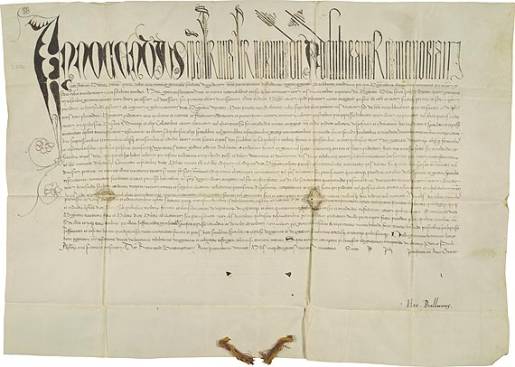During what is known as the Little Ice Age, the grip of freezing weather, failing of crops, rising crime, and mass starvation resulted in an increasing fear of witches. On the request of German inquisitor Heinrich Kramer, Innocent VIII issued the papal bull known as Summis desiderantes(5 December 1484), which supported Kramer’s investigations against magicians and witches:
- “It has recently come to our ears, not without great pain to us, that in some parts of upper Germany, […] Mainz, Koin, Trier, Salzburg, and Bremen, many persons of both sexes, heedless of their own salvation and forsaking the catholic faith, give themselves over to devils male and female, and by their incantations, charms, and conjurings, and by other abominable superstitions and sortileges, offences, crimes, and misdeeds, ruin and cause to perish the offspring of women, the foal of animals, the products of the earth, the grapes of vines, and the fruits of trees, as well as men and women, cattle and flocks and herds and animals of every kind, vineyards also and orchards, meadows, pastures, harvests, grains and other fruits of the earth; that they afflict and torture with dire pains and anguish, both internal and external, these men, women, cattle, flocks, herds, and animals, and hinder men from begetting […]”
Kramer would later write the polemic Malleus Maleficarum in 1486, which stated that witchcraft was to blame for bad weather. These remarks are included in Part 2, Chapter XV, which is entitled: “How they Raise and Stir up Hailstorms and Tempests, and Cause Lightning to Blast both Men and Beasts”:
- “Therefore it is reasonable to conclude that, just as easily as they raise hailstorms, so can they cause lightning and storms at sea; and so no doubt at all remains on these points.”
Both the papal letter appended to the work and the supposed endorsement of Cologne University for it are problematic. The letter of Innocent VIII is not an approval of the book to which it was appended, but rather a charge to inquisitors to investigate diabolical sorcery and a warning to those who might impede them in their duty, that is, a papal letter in the by then conventional tradition established by John XXII and other popes through Eugenius IV and Nicholas V (1447-55).
In 1487, Innocent also confirmed Tomas de Torquemada as Grand Inquisitor of Spain, a role in which he has become infamous.
Innocent VIII died on 25 July 1492 leaving behind him two illegitimate children born before he entered the clergy “towards whom his nepotism had been as lavish as it was shameless” In 1487 he married his elder son Franceschetto Cybo (d. 1519) to Maddalena de’ Medici (1473–1528), the daughter of Lorenzo de’ Medici, who in return obtained the cardinal’s hat for his thirteen-year-old son Giovanni, later Pope Leo X.


Pingback: Summis desiderantes affectibus, why women? - Historum - History Forums
Pingback: writeessay